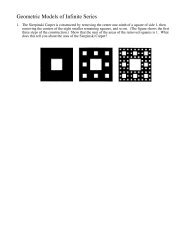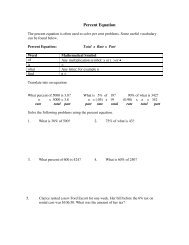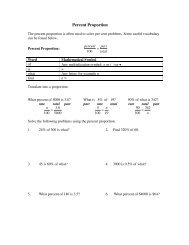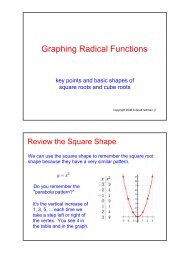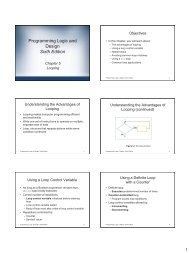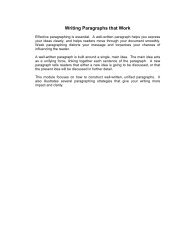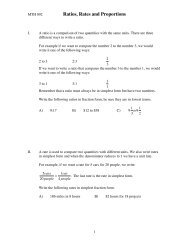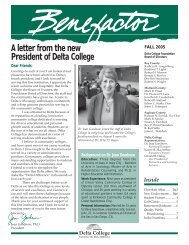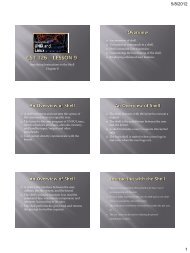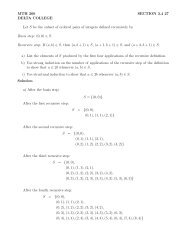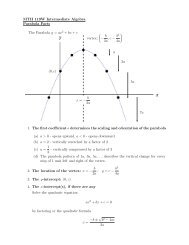How to Make Sense Out of Science
How to Make Sense Out of Science
How to Make Sense Out of Science
Create successful ePaper yourself
Turn your PDF publications into a flip-book with our unique Google optimized e-Paper software.
Psuedo<strong>Science</strong> and Risk Analysis<br />
modified from David H. Levy, September 20, 1998, Parade Magazine<br />
Have you been baffled or bored by a science report? Have you ever had your hopes or fears raised by<br />
the anouncement <strong>of</strong> a breakthrough or discover-- only <strong>to</strong> learn later that it wasn’t all it was<br />
proclaimed <strong>to</strong> be. Here are some ways <strong>to</strong> improve your understanding.<br />
The Skinny on Fat<br />
Burning Food<br />
Warning:<br />
Devatation by El<br />
Nino Predicted<br />
When headlines such as these appear, their s<strong>to</strong>ries<br />
become the subject <strong>of</strong> conversations around the<br />
world-- talks spiced with optimisim and confusion.<br />
Imagine the hopes raised in the millions battling<br />
cancer. Did the news mean that pople never have<br />
<strong>to</strong> worry about cancer again? Or that we all have <strong>to</strong><br />
worry about a catasrophe at the hands <strong>of</strong> El Nino?<br />
Unfortunately scince dones workd that way. Itr<br />
rarely arrives at final answers. People battleing<br />
cancer or victims <strong>of</strong> El Nino may find this<br />
frustrating, but the truth is the Nature does not<br />
yield her secrets easily. Scince is done in<br />
increments, where an idea is fashioned in<strong>to</strong> an<br />
experiment, the outcome leading <strong>to</strong> an increase in<br />
knowledge.<br />
<strong>Science</strong> is not a set <strong>of</strong> definitive results but a<br />
way <strong>of</strong> understanding the world around us. Its real<br />
work is slow. The scientific method, as many <strong>of</strong> us<br />
learned in school, is a gradual process that begins<br />
with observations that lead us <strong>to</strong> a purpose,<br />
problem or question <strong>to</strong> be answered. It includes<br />
gathering information about a specific question,<br />
developing a hypothesis that answers the question,<br />
and then performing an experiment that either<br />
supports or disproves the hypothesis. In medicine,<br />
when a new drug is proposed that might cure or<br />
control a disease, it is first tested on a large random<br />
group <strong>of</strong> people, and their reactions are then<br />
compared with those <strong>of</strong> another random group not<br />
given the drug. All reactions in both froups are<br />
carefully recorded and compared, and the drug is<br />
evaluated for its short term and long term effects.<br />
All <strong>of</strong> this takes time - and patience.<br />
It’s the result <strong>of</strong> course that makes the best<br />
news-- not the years <strong>of</strong> quiet backwater work<br />
that characterize the bulk <strong>of</strong> scientific inquiry.<br />
After an experiment is concluded, the result<br />
continues <strong>to</strong> be scrutinized. If it is submitted<br />
for publica<strong>to</strong>n, it goes <strong>to</strong> a group <strong>of</strong> other<br />
scientists, who review the work and evaluate<br />
the methods, the data reported and the<br />
conclusions drawn by the author. If the report<br />
is judged worthy it is accepted for publication<br />
by a pr<strong>of</strong>essional journal or reported at a<br />
conference. Those reports that catch the eye <strong>of</strong><br />
the news media become the basis <strong>of</strong> a press<br />
release and announced <strong>to</strong> the world.<br />
<strong>Science</strong> is <strong>to</strong>o important, <strong>to</strong>o<br />
interesting and <strong>to</strong>o much fun not<br />
<strong>to</strong> be communicated accurately,<br />
without misleading exaggeration<br />
and in a way that we all can<br />
understand.<br />
The world may think that the announcement<br />
signifies the end <strong>of</strong> the process, but this is only<br />
the beginning. A publication is really a<br />
challenge stating, “Here’s my result. Prove me<br />
wrong!” Others researchers interested in the<br />
same subject will try <strong>to</strong> repeat the experiment<br />
and the more <strong>of</strong>ten the same result is
supported, the better the chances that the result is<br />
sound or valid. Einstein was right when he said,<br />
“No experiment can at any time prove me wrong.”<br />
In August 1996, NASA announced the discovery in<br />
Antarctica <strong>of</strong> a meteorite from Mars that might<br />
contain evidence <strong>of</strong> ancient life on another world.<br />
As President Clin<strong>to</strong>n said that day, the possibility<br />
that life had existed on Mars billions <strong>of</strong> years ago<br />
was potentially one <strong>of</strong> the great discoveries <strong>of</strong> our<br />
time. After the excitement word down and initial<br />
papers were published, other researchers began<br />
looking at samples from the same meteorite. Some<br />
concluded that the “evidence <strong>of</strong> life” was most<br />
likely contamination from Antarctic ice or that<br />
there was nothing organic in the rock. Was this a<br />
failure <strong>of</strong> science, as some news reports trumpeted?<br />
No! It was a good example <strong>of</strong> the scientific<br />
method working the way it is supposed <strong>to</strong>.<br />
Preliminary findings are always tentative until the<br />
weight <strong>of</strong> more evidence makes them more certain.<br />
Scientists spend years on research, publish their<br />
findings, and debate these findings with other<br />
scientists. That’s how we learn. Like climbing a<br />
steep mountain, we struggle up three feet and fall<br />
back two. It’s a process filled with<br />
disappointments and frustration (think about<br />
Thomas Edison and the light bulb), but somehow<br />
we keep on moving ahead in our knowledge about<br />
the world around us.<br />
Why <strong>Science</strong> Articles Are Sometimes Misleading<br />
If you have trouble understanding science news<br />
items it might be due <strong>to</strong> these problems.<br />
•A poor understanding on the part <strong>of</strong> the writer<br />
might give a s<strong>to</strong>ry the wrong focus. For<br />
example, the s<strong>to</strong>ry about a recently observed<br />
explosion in space compared it <strong>to</strong> the Big Bang-<br />
- which most scientists believe, was the ultimate<br />
blast that started the Universe. In fact, the two<br />
events had nothing <strong>to</strong> do with each other. The<br />
recent explosion was a large burst <strong>of</strong> gamma<br />
rays from one tiny area <strong>of</strong> space. It was a larger<br />
form <strong>of</strong> what astronomers see very <strong>of</strong>ten in<br />
space and nowhere near the magnitude <strong>of</strong> the<br />
Big Bang.<br />
•Many scientific press releases seem bent on<br />
convincing the world that their news is the<br />
most important news <strong>of</strong> the year. But in our<br />
fast-paced world, where scientific press releases<br />
are issued at the rate <strong>of</strong> ten or more per day,<br />
who judges which is the most important? Each<br />
<strong>of</strong> them reports some new development,<br />
written in a lively and simplified style that tries<br />
<strong>to</strong> show that<br />
the public<br />
cannot live<br />
without the<br />
news.<br />
•The headline is<br />
<strong>of</strong>ten<br />
misleading.<br />
Journalists are<br />
taught <strong>to</strong> write<br />
headlines that<br />
capture the audience. If one were <strong>to</strong> simply<br />
scan headlines they might miss the true<br />
interpretation <strong>of</strong> the event <strong>to</strong> the sensational<br />
appeal <strong>to</strong> our interests.<br />
The Scientific Method<br />
Scientists are like detectives; they make<br />
observations, gather evidence, and attempt <strong>to</strong> reach<br />
conclusions. Suppose you were <strong>to</strong> buy a detective<br />
s<strong>to</strong>ry and upon opening the book you found only<br />
empty pages except for a statement on the last page<br />
which said: “Based on the evidence the Inspec<strong>to</strong>r<br />
Gadget concluded the butler was the murderer”.<br />
Exciting? Hardly! The detective’s methods and the<br />
excitement <strong>of</strong> discovery during the investigation are<br />
missing.... in other words, the process is the<br />
convincing part <strong>of</strong> the s<strong>to</strong>ry. To learn the<br />
conclusions and products <strong>of</strong> science without<br />
understanding how these conclusions were<br />
formulated is like reading just the end <strong>of</strong> the<br />
detective s<strong>to</strong>ry. No wonder some scientific claims<br />
are hard <strong>to</strong> swallow. Theories and principles are<br />
important, but the process by which they are<br />
produced is what science is all about. The process at<br />
the heart <strong>of</strong> scientific discovery is called the scientific<br />
method.<br />
The Nature <strong>of</strong> <strong>Science</strong><br />
Check your understanding, can you.........<br />
1. List the steps <strong>of</strong> the scientific method.<br />
2. Write down 5 words associated with the<br />
process <strong>of</strong> science.<br />
3. Think <strong>of</strong> three questions that science<br />
cannot answer?



